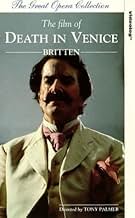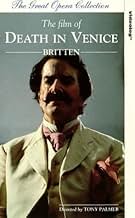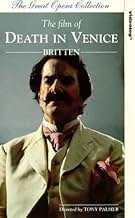Ajouter une intrigue dans votre langueGustav Von Aschenbach, a passionate composer, arrives in Venice as a result of wanderlust and there meets a young man by whose beauty he becomes obsessed.Gustav Von Aschenbach, a passionate composer, arrives in Venice as a result of wanderlust and there meets a young man by whose beauty he becomes obsessed.Gustav Von Aschenbach, a passionate composer, arrives in Venice as a result of wanderlust and there meets a young man by whose beauty he becomes obsessed.
James Bowman
- Apollon
- (voix)
Vincent Redmon
- Tadzio
- (as Vincent Redman)
English Opera Group Chorus
- Various Tourists, Venetians, Strawberry Sellers, Hotel Staff, Newspaper Vendors, Beggars & Fire-Eaters
- (as Members of the English Opera Group)
Histoire
Le saviez-vous
- ConnexionsReferenced in Cracker: Best Boys: Part 2 (1995)
Commentaire à la une
I recently saw the film of English National Opera's 2013 production of Death in Venice. It was interesting to compare it with this 1981 film, directed by Tony Palmer. The ENO production makes effective use of back-projections of Venetian locations whereas Palmer uses film of actual Venetian locations spliced together with scenes shot in a studio. It looks good, although the effect was somewhat marred in the fuzzy print that I saw.
This is very much a film, rather than a filmed opera. As the protagonist, Aschenbach, reflects upon his situation Palmer illustrates his thoughts. Also, controversially, he uses voice-over so that Aschenbach is seen silently musing while he sings on the soundtrack. Normally I would hate this but it seems to work and it helps in understanding the psychologically complex story to be able to see what Aschenback is thinking about. I could hear every word that tenor Robert Gard sang, something that could not be said for the ENO production where I had to listen with a synopsis in my hand. Only occasionally did I get the impression that I was watching a film with an operatic backing track.
John Shirley-Quirk successfully manages the seven cameo roles of various irritating people that Aschenbach comes into contact with. The object of Aschenbach's affection, the boy Tadzeo, played by Vincent Redman, is of course a non-singing, non-speaking role. To be honest, I found him less than beautiful beside his two beautiful sisters. Aschenbach, of course, does find him beautiful and describes his sisters as plain. I did enjoy the scene where the slender youth descends into a Turkish bath watched by fat naked Italians, a scene that is not in the opera but one that is used by Palmer to open out the action.
I like Britten's score with its sensitive orchestration and Balinese tinkling. Mifanwy Piper does her usual expert job on the libretto. Ultimately though this not one of my favourite Britten operas because I think the source material, the novella by Thomas Mann is too thin and, frankly, rather distasteful. I can understand why Britten empathised with this story of a dirty old man following an adolescent boy around Venice but it is a theme that probably does not have universal appeal.
This is very much a film, rather than a filmed opera. As the protagonist, Aschenbach, reflects upon his situation Palmer illustrates his thoughts. Also, controversially, he uses voice-over so that Aschenbach is seen silently musing while he sings on the soundtrack. Normally I would hate this but it seems to work and it helps in understanding the psychologically complex story to be able to see what Aschenback is thinking about. I could hear every word that tenor Robert Gard sang, something that could not be said for the ENO production where I had to listen with a synopsis in my hand. Only occasionally did I get the impression that I was watching a film with an operatic backing track.
John Shirley-Quirk successfully manages the seven cameo roles of various irritating people that Aschenbach comes into contact with. The object of Aschenbach's affection, the boy Tadzeo, played by Vincent Redman, is of course a non-singing, non-speaking role. To be honest, I found him less than beautiful beside his two beautiful sisters. Aschenbach, of course, does find him beautiful and describes his sisters as plain. I did enjoy the scene where the slender youth descends into a Turkish bath watched by fat naked Italians, a scene that is not in the opera but one that is used by Palmer to open out the action.
I like Britten's score with its sensitive orchestration and Balinese tinkling. Mifanwy Piper does her usual expert job on the libretto. Ultimately though this not one of my favourite Britten operas because I think the source material, the novella by Thomas Mann is too thin and, frankly, rather distasteful. I can understand why Britten empathised with this story of a dirty old man following an adolescent boy around Venice but it is a theme that probably does not have universal appeal.
Meilleurs choix
Connectez-vous pour évaluer et suivre la liste de favoris afin de recevoir des recommandations personnalisées
Détails
Contribuer à cette page
Suggérer une modification ou ajouter du contenu manquant


















